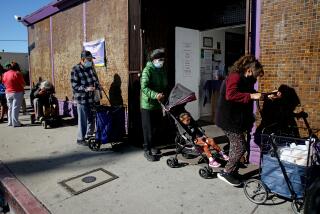There Is Room at the Inn, Alas
- Share via
Homelessness is hard at any time of the year, but it is at its most painful when the weather turns rainy and chilly. Southern California’s version of winter is here, as evidenced by all the homeless huddling under donated blankets on sidewalks.
There are vacancies now at Skid Row single-resident-occupancy hotels because after cuts in the county’s general relief program many people no longer can afford even such bare-bones shelter. The general relief payment, recently reduced from $293 to $212 a month, is not enough to rent a room, unless the recipient is lucky enough to get one of the few subsidized by the Community Redevelopment Agency. Or unless a measure offered by Gloria Molina is adopted by the Los Angeles County Board of Supervisors.
Nonprofit groups and other public-spirited organizations operate rehabilitated hotels as close as possible to the break-even point. Most cannot lower rents to $212 because it typically costs $245 a month to maintain a room.
The supervisors are reluctant to restore the full amount that the county cut, estimated at $70 million, because they are trying to accumulate a surplus this year to cover next year’s projected county deficit. Fair enough, but the supervisors nonetheless could provide a little relief by buying a few of Molina’s ideas.
Molina wants to end the financial penalty for recipients who choose to share housing. Another of her recommendations would allow any recipient who gets an odd job to keep his or her subsidy. The supervisor also wants to make sure that homeless people spend county money on roofs over their heads, not on booze or drugs; she proposes that the county switch to a direct housing subsidy, somewhat similar to the federal Section 8 program, which gives the money to the landlord, not the tenant. The proposal, which would put a few dollars in the welfare recipient’s pocket in addition to paying $245 per room, would cost a little more because of the higher housing subsidy and the administrative costs involved. However, it would guarantee housing and prevent recipients from wasting their checks.
Molina’s proposals are due to come up for a vote today. They make sense and, according to estimates, would cost only $4 million more. We hope they will pass.
More to Read
Sign up for Essential California
The most important California stories and recommendations in your inbox every morning.
You may occasionally receive promotional content from the Los Angeles Times.





